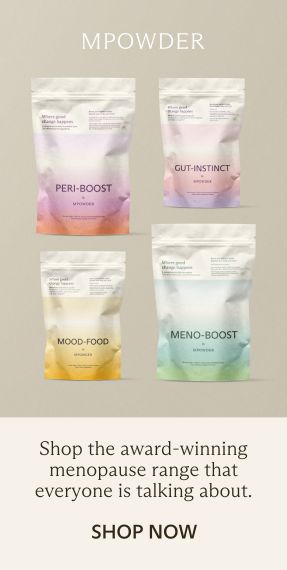But as oestrogen levels decline during menopause, collagen production drops dramatically too. In fact, women can lose up to 30% of their collagen in the first five years after their menopause 1 anniversary, and it’s part of the reason so many of us experience a rapid change in our skin elasticity - as well as, joint stiffness, slower wound healing, and digestive shifts.
In this guide, we explore collagen and menopause, why the connection matters, and how you can boost your collagen levels naturally — from the inside out.
The link between collagen and menopause
- Collagen forms the structural matrix of skin, bones, muscles, and joints
- Oestrogen plays a key role in stimulating collagen synthesis
- As hormones decline, collagen degradation accelerates
- The skin becomes thinner, less elastic and drier — and joints may feel stiffer or more prone to injury.
How to support collagen during menopause
The body needs a steady supply of specific nutrients and co-factors to build and protect collagen. Here’s how to boost it naturally:
Vitamin C
Critical for collagen synthesis and antioxidant protection
→ Found in: PERI-BOOST, MENO-BOOST
Zinc and Copper
Support connective tissue formation and enzymatic activity in collagen production
→ Found in: PERI-BOOST, MENO-BOOST, MOOD-FOOD
Pea Protein
Provides the amino acids your body uses to make new collagen
→ Found in: PERI-BOOST
Silica (from bamboo extract)
Supports skin elasticity and connective tissue structure
→ Found in: PERI-BOOST, MENO-BOOST
Anti-inflammatories (Turmeric, Omega Oils)
Help protect existing collagen from degradation
→ Found in: MOOD-FOOD (Turmeric), MENO-BOOST (Ahiflower® oil, a rich vegan source of Omegas)
Spotlight on:
Dracobelle Nu® (Moldavian Dragonhead)
Included in our PERI-BOOST formulation, Dracobelle Nu® is a patented extract of Moldavian Dragonhead developed by Mibelle Biochemistry.
- Clinical research shows that Dracobelle Nu® can naturally stimulate collagen production and improve:
- Skin moisture
- Elasticity
- Visible plumpness and glow
Many of our customers report a noticeable difference in their skin’s smoothness and hydration within a few weeks of starting PERI-BOOST — and we believe this extract plays a significant role.
Should I take collagen supplements?
Hydrolysed collagen peptides have been shown to support skin hydration and elasticity2, but collagen alone is not the full story. Without co-factors like vitamin C, zinc, and protein, the body can’t effectively use it.
That’s why we believe in blended formulations — like PERI-BOOST — which deliver the full nutritional ecosystem your body needs to rebuild from within.
Final thought
Collagen and menopause are deeply connected, and there is beauty in the way our bodies and faces evolve over time. But it’s important to protect and nourish our bodies. Collagen is key to our healthspan. And, with the right tools, you can actively support your body’s natural repair processes through food and smart supplementation and botanicals too.
Start by speaking with your GP. And then look to blended solutions that recognise both herbal and vitamin and mineral synergy. PERI-BOOST is designed to nourish skin, joints, and hormonal balance from the inside out.
Reference
Brincat, M. (2000). Hormone replacement therapy and the skin. https://pubmed.ncbi.nlm.nih.gov/10959703/
Choi, S.Y., et al. (2014). Effects of collagen tripeptide supplement on skin properties: a prospective, randomized, placebo-controlled study. https://pubmed.ncbi.nlm.nih.gov/25289590/
Share Twitter Facebook Pinterest

